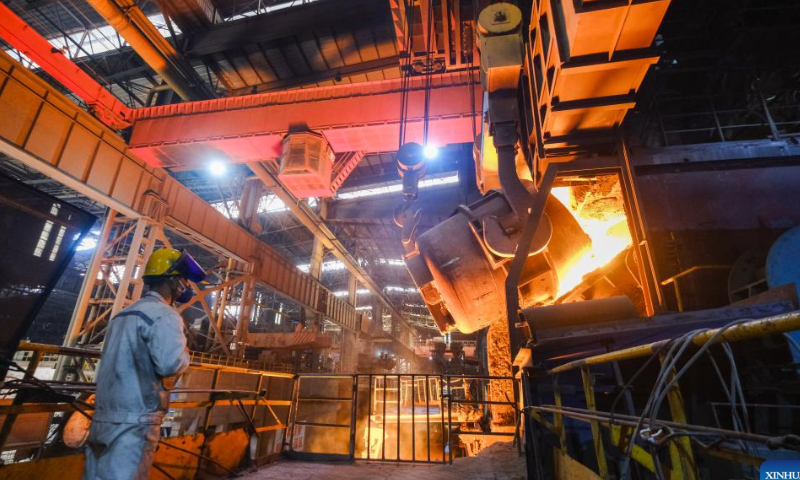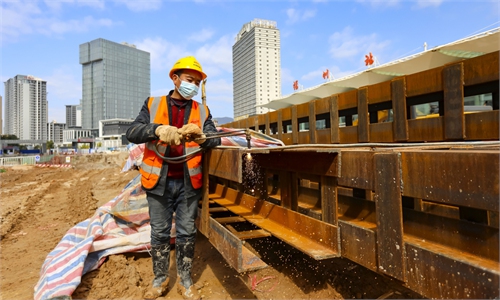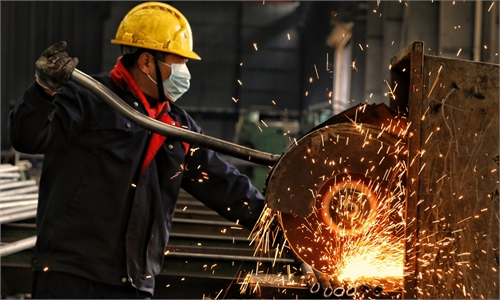China's steel industry will remain healthy, vigorous in 2023; Australian imports to expand
Pent-up demand for cars, ships, appliances will buoy sector

A staff member checks the operation of steel furnace at a special steel company in Xinfeng Town of Nanhu District, Jiaxing, east China's Zhejiang Province, Jan. 26, 2023. Many companies in Nanhu District of Jiaxing have sped up production during the Spring Festival holiday to ensure delivery of orders, while offering cash gifts and other rewards for employees. Photo: Xinhua
China's steel industry, an economic gauge, will remain healthy and vigorous, driven by pent-up demand after the nation's downgraded epidemic response and efforts to stabilize supplies and curb prices, according to insiders at a membership conference of the China Iron and Steel Association (CISA) on Monday.
Backed by a stabilized real estate market and the rebound of other steel-consuming industries such as vehicles, ships and home appliances, the steel sector will trend higher in 2023, said CISA's Executive Chair He Wenbo at the meeting.
As a result, a boost is likely for imports of iron ore and coking coal from countries including Australia, a major supplier of bulk commodities, experts said.
The positive outlook for steel producers is based on the improving prospects of the vehicle sector and the nation's shipyards, both of which are important steel consumption industries.
Affected by the COVID-19 pandemic last year, car sales were weak. As the epidemic eased and tax breaks for vehicle purchases were extended, production and sales improved, He said, and the trend will persist this year.
In 2023, China's car sales are expected to return to the level of 2017, which is estimated to be at least 28 million units, bolstered by strong exports, especially when it comes to new-energy vehicles, according to the China Automobile Dealers Association.
China's shipbuilding industry will remain stable. Factors such as the aging of existing ships, the pressure of new environmental regulations, the reshaping of global trade routes caused by geopolitics and the increase in demand, will drive up demand for shipbuilding steel, He said.
Moreover, the rapid development of domestic multimodal transport, road-to-rail transportation and the development of China-Europe freight trains will support the demand this year for containers, another steel-consuming sector, He noted.
Furthermore, the real estate market, the largest steel consumption industry, is experiencing a positive trend amid policy support this year.
Other related businesses will also stay strong, such as the sales of home appliances, driven by pent-up demand and stimulus packages such as coupons provided by local governments and companies.
Due to global high inflation, prices for bulk commodities, including raw materials for steel making, have stayed high, posing challenges to the world's economic recovery.
China's resilient demand for steel is expected to inject new impetus into the economic recovery in the country and also around the world. The World Steel Association has predicted that global steel consumption in 2023 will be 1.814 billion tons, of which China alone will take about half.
In January, the new order index for domestic steel industry was 43.9, an increase of 5 points from the previous month, according to the China iron and steel industry purchasing managers' index, released by the CFLP Steel Logistics Professional Committee, indicating that steel demand remained stable and rebounded.
Booming domestic steel consumption may lead to strong imports of iron ore and coking coal from countries including Australia, Wang Guoqing, research director at the Beijing Lange Steel Information Research Center, told the Global Times on Monday.
Australia has remained the largest exporter of iron ore to China - a total of 729.32 million tons of Australian iron ore were imported in 2022, up 5.1 percent year-on-year, taking around 66 percent of total iron ore imports. Brazil held a 20.5 percent share, ranking second.
The diversification and expansion of coking coal supplies may help further stabilize domestic steel prices and downstream players improve their profit margins, experts said.
The first batch of Australian coking coal, an essential input for iron and steel, arrived at South China's Zhanjiang on February 8, with more ships to come.
Wang said these factors combined signal trade growth between China and Australia, and "with the gradual resumption of Australian coal trade and the domestic consumption rebound, market supply and demand will be better balanced."


